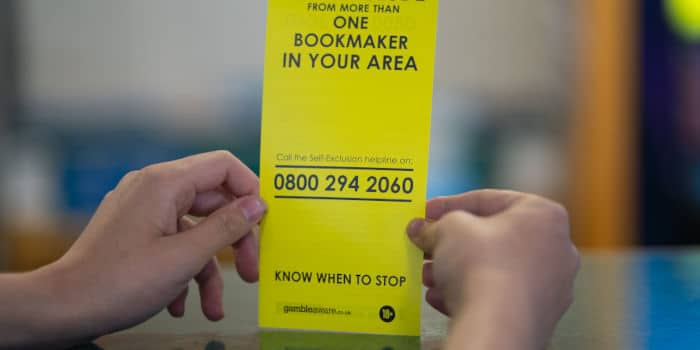- Casino
- By State
- Alabama
- Alaska
- Arizona
- Arkansas
- California
- Colorado
- Connecticut
- Delaware
- Georgia
- Florida
- Hawaii
- Idaho
- Illinois
- Indiana
- Iowa
- Kansas
- Kentucky
- Louisiana
- Maine
- Massachusetts
- Maryland
- Michigan
- Minnesota
- Mississippi
- Missouri
- Montana
- Nebraska
- Nevada
- New Hampshire
- New Jersey
- New Mexico
- New York
- North Carolina
- North Dakota
- Ohio
- Oklahoma
- Oregon
- Pennsylvania
- Rhode Island
- South Carolina
- South Dakota
- Tennessee
- Texas
- Utah
- Vermont
- Virginia
- Washington
- West Virginia
- Wisconsin
- Wyoming
- By State
- Slots
- Poker
- Sports
- Esports
Adoption of AI in the Gambling Industry Sparks Debate
Despite the operational efficiencies, experts remain skeptical about the effectiveness of AI solutions when it comes to reducing gambling harm

Over the last decade, the development of artificial intelligence (AI) has made significant strides. For a few years, AI-powered solutions and technology expanded exponentially, impacting the development of different industries across the globe. Unsurprisingly, the gambling vertical saw the benefits of AI and incorporated such technology and solutions, propelling the growth of new products, analysis of large quantities of data and identifying specific patterns.
Ultimately, AI technology helps iGaming content providers develop software solutions and even plays an important part in the creativity process. For online gambling operators, solutions powered by AI help flag fraudulent attempts, scams as well as suspicious betting patterns. Undoubtedly the technology helped significantly reduce the need for manual labor, allowing iGaming operators to grow sustainably and efficiently.
AI-driven technology and solutions are going to be a part of the future of the betting and gaming industry considering their efficacy and success so far. Many operators leverage such solutions to uncover problem gambling patterns or identify potential gambling harm. But while the industry claims AI solutions can protect gamblers from excessive gambling, not everyone agrees.
Charles Ritchie, the co-chair of the charity Gambling with Lives, who was recently interviewed by BBC, criticized the benefits of using AI to reduce gambling harm. “Any claim that AI could be used by the gambling industry to reduce harm is just a smokescreen,” he explained. Moreover, Ritchie cited evidence from families affected by gambling harm saying that “the AI algorithms are simply not acted on.”
AI Can Help Flag Problem Gambling, Prevent Harm
Zoë Osmond, GambleAware’s chief executive, shared a different opinion, speaking about the balance needed when using AI solutions. She explained that while such solutions can improve the experiences for the consumers, it is imperative that AI is leveraged in a way to make positive change, ultimately helping prevent gambling harm and identifying potential signs of problem gambling.
“All talk of using AI to improve customer experience needs to be carefully offset and managed to make sure AI becomes a force for good in spotting the signs and preventing gambling harm.“
Zoë Osmond, chief executive of GambleAware
Late last month, the gambling regulator in the UK, the Gambling Commission, announced the results of its first Gambling Survey for Great Britain (GSGB). The Wave 1 report of the GSGB revealed that 48% of the participants in the study admitted to gambling in the last four weeks.
According to the newly released study, some 38% participated in online gambling. A bigger percentage of the players engaged only in online lotteries. Once those players were excluded, the rate of participation in iGaming activities fell to 16%.
The results of the study come in the context of the upcoming changes to the gambling sector in the UK. Among the changes, the government plans to implement affordability checks as well as limits for online slots.
Related Topics:
Jerome brings a wealth of journalistic experience within the iGaming sector. His interest in the industry began after graduating from college, where he regularly participated in local poker tournaments. This exposure led him to the growing popularity of online poker and casino rooms. Jerome now channels all the knowledge he's accrued to fuel his passion for journalism, providing our team with the latest scoops online.
Must Read
Industry
July 14, 2025
Senate Blocks Attempt to Reverse Gambling Tax Rule
More Articles







Sports
July 17, 2025
Canelo Alvarez Bets $500K on Usyk Defeating Dubois

Industry
July 16, 2025
ASA Cracks Down on Play’n GO for Problematic Ads

Industry
July 16, 2025
Ukraine Wants Real-Time Online Gambling Oversight

Sports
July 15, 2025
Undercover Spotters Catch Wimbledon Betting Spies

Industry
July 15, 2025
UK Considers Gambling Tax Hike to Fill Budget Gap

Industry
July 14, 2025
GambleAware Launches Milestone Self-Awareness App











